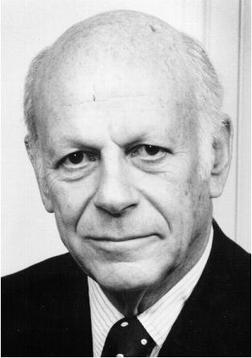

| Born in New York on 4 August
1910, William Schuman began composing in high school, forming a jazz
ensemble in which he played violin and banjo. He earned bachelor's and
master's degrees from Columbia University Teachers College, and he
studied at Juilliard with Roy Harris, who exercised a strong influence
on the young composer and brought him to the attention of Serge
Koussevitzky, who championed many early works. Schuman wrote a plethora of works in virtually every musical genre, each mirroring his strong personality in their sharply defined sense of structure, line, and dynamism. He incorporated American jazz and folk traditions into works which ranged from a harmonically conservative early style to later excursions into dissonance and polytonality. The secular cantata A Free Song received the first Pulitzer Prize in music in 1943. Schuman was also a vital force in American musical life as an administrator. By the age of 35, he had been director of publications for G. Schirmer, Inc., and appointed President of the Juilliard School. As Juilliard's President, Schuman reoriented the entire music education process, and it was under his aegis that the world-renowned Juilliard Quartet was formed. In 1962, he was appointed first president of the newly-founded Lincoln Center for the Performing Arts. In the course of his career Schuman was Director of the Koussevitzky Music Foundation, the Walter W. Naumburg Foundation, the Chamber Music Society of Lincoln Center, National Educational Television, and the Film Society of Lincoln Center. In addition to his election to both the American Academy of Arts and Sciences and the Royal Academy of Music, Schuman received the National Medal of Arts in 1987 and in 1989 was honored by the Kennedy Center in Washington. Schuman died in New York City on February 15, 1992. A more detailed biography and a list of his awards is presented at the end of this webpage. |
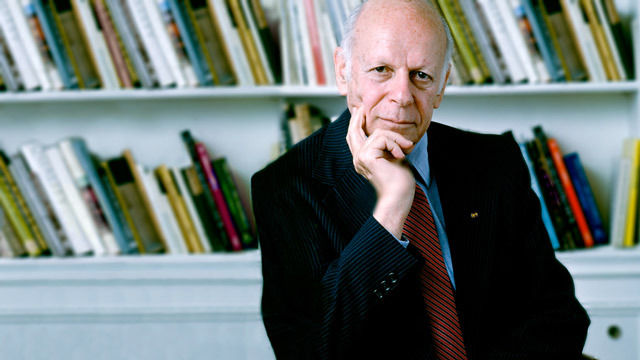 WS: I don’t think it
has anything to do with the
quality or the quantity of the composition. I think you write;
you have your own standards. When I was younger, of course, I
had much more energy, so that I would write for very, very long hours,
and I would keep track. My system was a very simple one — any
approach to writing music works except neglect. So early on I
said to myself, “You can
do anything else that you want
to do, but you have to find between six hundred hours and a thousand
hours to be alone in a room.”
That’s a sine qua non of the
conditions for composing, as far as I’m concerned. So I used to
keep a little diary
of time. I’d go to the school maybe at 8:30 in the morning,
having worked for an hour first, so I’d put down one hour. Or,
if I went at 11:23, I’d put down two hours and twenty-three
minutes. By the end of the week I’d add up the hours and the
minutes that I actually worked, and by the summer time I would
usually have about three hundred hours chalked up. Then, of
course, in the summer time I had more time to work. I rarely
reached a thousand, but it was never less than six
hundred. It sounds like a very cold way of going about it,
but it was the only practical way that I could devise of assuring
myself the time; the reason being that everything else you do is
so much easier than writing music.
WS: I don’t think it
has anything to do with the
quality or the quantity of the composition. I think you write;
you have your own standards. When I was younger, of course, I
had much more energy, so that I would write for very, very long hours,
and I would keep track. My system was a very simple one — any
approach to writing music works except neglect. So early on I
said to myself, “You can
do anything else that you want
to do, but you have to find between six hundred hours and a thousand
hours to be alone in a room.”
That’s a sine qua non of the
conditions for composing, as far as I’m concerned. So I used to
keep a little diary
of time. I’d go to the school maybe at 8:30 in the morning,
having worked for an hour first, so I’d put down one hour. Or,
if I went at 11:23, I’d put down two hours and twenty-three
minutes. By the end of the week I’d add up the hours and the
minutes that I actually worked, and by the summer time I would
usually have about three hundred hours chalked up. Then, of
course, in the summer time I had more time to work. I rarely
reached a thousand, but it was never less than six
hundred. It sounds like a very cold way of going about it,
but it was the only practical way that I could devise of assuring
myself the time; the reason being that everything else you do is
so much easier than writing music.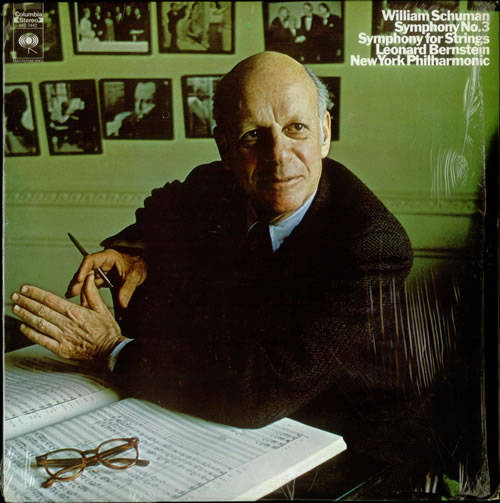 WS: Yes. The
most important thing
for the composer is to get the music out and performed, and if
possible, recorded. In my own case, I know from my mail over the
years — much of which is from young people all
over the country — that many of them have never heard a live
performance of my music, but they know the records. They write
about the records and they ask the most intelligent
questions and make the most remarkable comments. The only avenue
that we
really have to the interested listening public is the recording,
because the average symphonic audience is not particularly
interested. They might like the work very much, but it would
never occur to them to ask to have it played again. Even
composers of my age, who have long since passed their voting age, are
not known necessarily. Even their most successful works might go
ten years in one city before they’re played again.
WS: Yes. The
most important thing
for the composer is to get the music out and performed, and if
possible, recorded. In my own case, I know from my mail over the
years — much of which is from young people all
over the country — that many of them have never heard a live
performance of my music, but they know the records. They write
about the records and they ask the most intelligent
questions and make the most remarkable comments. The only avenue
that we
really have to the interested listening public is the recording,
because the average symphonic audience is not particularly
interested. They might like the work very much, but it would
never occur to them to ask to have it played again. Even
composers of my age, who have long since passed their voting age, are
not known necessarily. Even their most successful works might go
ten years in one city before they’re played again.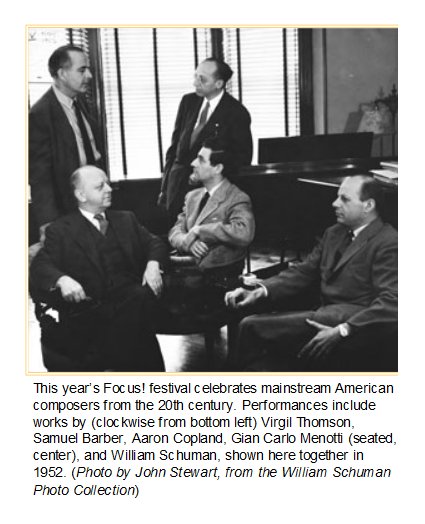
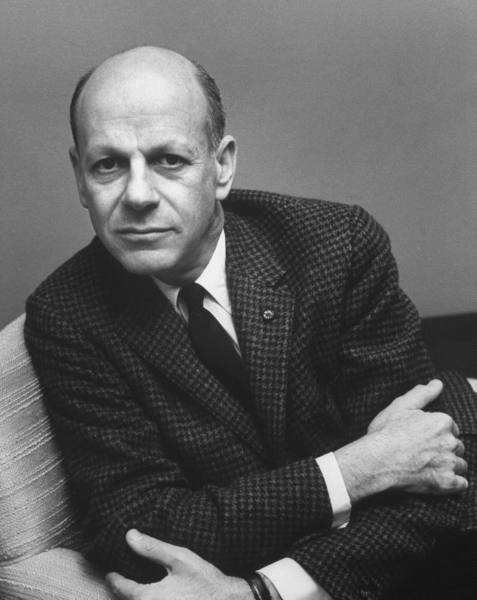 WS: In my crystal
ball, I will say that the problems
of being a composer are impossible, and thank God they’re going on
just that way into the future. No red-blooded American boy would
choose the career of composing symphonic music. Nobody’s
interested in it; you can’t make much money doing it. The
only point about it is that it’s just about as great a calling as I can
possibly imagine, in idealistic terms. In practical terms, it’s
an absurdity.
WS: In my crystal
ball, I will say that the problems
of being a composer are impossible, and thank God they’re going on
just that way into the future. No red-blooded American boy would
choose the career of composing symphonic music. Nobody’s
interested in it; you can’t make much money doing it. The
only point about it is that it’s just about as great a calling as I can
possibly imagine, in idealistic terms. In practical terms, it’s
an absurdity. 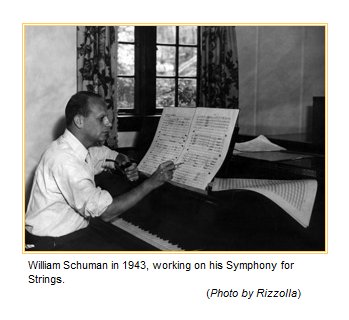 WS: I really don’t
know. I know that Gunther
Schuller and a few of my other friends are very much interested in
combining these disparate worlds. I don’t think there’s a great
connection, myself. There’s a lot of movement these days to
equate the value of all music, and in some newspapers you’ll see as
much space given to review of a rock star or the latest performer, as
the latest performance of a Beethoven symphony. I believe that
there’s no such thing as a bad kind of
music. I think there are better and poorer examples of various
kinds of music. On the other hand, some music is
meant to be listened to with complete concentration of heart and mind,
and other music is entertainment music. The entertainment
music should be valued for its entertainment purposes, and not be
confused with art that is meant for contemplation. They are very
different kinds of things, and I’ve always found that difference.
I still find that difference.
WS: I really don’t
know. I know that Gunther
Schuller and a few of my other friends are very much interested in
combining these disparate worlds. I don’t think there’s a great
connection, myself. There’s a lot of movement these days to
equate the value of all music, and in some newspapers you’ll see as
much space given to review of a rock star or the latest performer, as
the latest performance of a Beethoven symphony. I believe that
there’s no such thing as a bad kind of
music. I think there are better and poorer examples of various
kinds of music. On the other hand, some music is
meant to be listened to with complete concentration of heart and mind,
and other music is entertainment music. The entertainment
music should be valued for its entertainment purposes, and not be
confused with art that is meant for contemplation. They are very
different kinds of things, and I’ve always found that difference.
I still find that difference.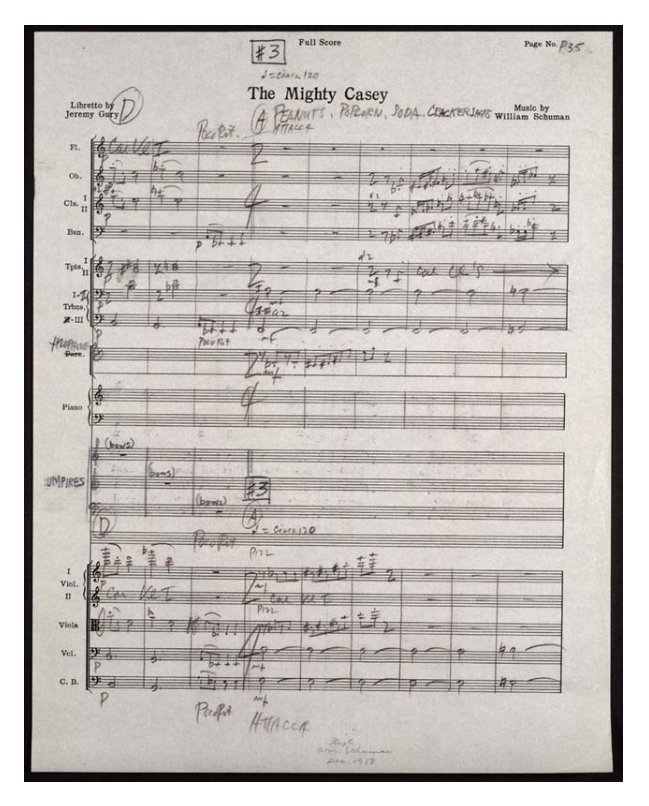 WS: It’s being done
at the Hall
of Fame in Cooperstown this summer.
WS: It’s being done
at the Hall
of Fame in Cooperstown this summer.| William Howard Schuman was born
in New York City on August 4, 1910, the second child of Samuel and
Rachel Schuman. He began to study the violin as a young boy and later
played a number of other instruments as well. His broad musical
interests ranged from his own jazz band and the school orchestra to
family evenings singing operettas and musical comedy excerpts as well
as "semiclassics." On his own, he wrote some original popular songs.
But music definitely took second place to Schuman's all-consuming
passion, baseball. Looking back on his youth, he would later claim that
baseball was the main focus of his early years. In 1928 Schuman entered New York University to prepare for a business degree at the School of Commerce, while at the same time working for an advertising agency. He continued to collaborate on pop songs with E. B. Marks, Jr., an old friend from summer camp, and also created some forty songs with lyricist Frank Loesser, a neighbor who was also at the beginning of his career. Loesser's first publication, in fact, was a song with music by Schuman. Together they wrote many songs for radio, vaudeville, and nightclub acts. In April 1930, having attended (albeit unwillingly) his first professional symphony orchestra concert, Schuman suddenly realized that baseball, business, and popular music must be relegated to subsidiary positions (but never forgotten) in favor of composing "classical" or concert music. Realizing that extensive training would be necessary to reach his goals, Schuman withdrew from New York University to study harmony with Max Persin and to hear as many concerts and operas as he could. He began counterpoint lessons with Charles Haubiel at The Juilliard School and attended summer courses in orchestration with Adolf Schmid and harmony with Bernard Wagenaar. At Teachers College of Columbia University, Schuman earned a B.S. in music education (1935), and set him thinking about the need to reform and improve music education. In the fall of 1935, Schuman settled into his first teaching position, at Sarah Lawrence College, Bronxville, N.Y., where he remained on the faculty for a decade. Highlights of his life during these years were his marriage to Frances ("Frankie") Prince on March 27, 1936, composition studies with Roy Harris, earning an M.A. from Columbia (1937), and the first successful public performances of his music. Although Schuman had now withdrawn from several of his earliest efforts, it was these orchestral and chamber compositions that generated his first prizes and commissions. His Symphony No. 2 came to the attention of Aaron Copland, who wrote in Modern Music (May 1938): "Schuman is, as far as I am concerned, the musical find of the year. There is nothing puny or miniature about this young man's talent." In 1944 G. Schirmer, Inc., appointed Schuman Director of Publications. He began work there even before leaving the Sarah Lawrence faculty and continued to serve Schirmer as Special Publications Consultant after moving in 1945 to his next post, the presidency of The Juilliard School. During the 1940s he received his first of many honorary doctorates, became the father of a son and a daughter, and was awarded the first Pulitzer Prize ever given in the field of musical composition. In spite of the heavy demands of his Juilliard presidency – into which he threw himself wholeheartedly, making essential and lasting improvements in the school – he remained first and foremost a composer. As Juilliard president, Schuman convinced the planners of Lincoln Center that the School should become one of its constituent organizations. It was not long before the Lincoln Center board of directors named him to preside over the entire complex. Schuman's tenure as president of Lincoln Center began in January 1962, months before the official opening of Philharmonic Hall (as Avery Fisher Hall was then known), the first completed building. He guided the growth of Lincoln Center, establishing both the Chamber Music Society and the Film Society of Lincoln Center. During this time, he continued to add to his own catalogue of compositions. In 1968 Schuman suffered a heart attack and while recuperating took stock of his personal and professional priorities. His ultimate decision was that he would forgo major administrative posts, and resign from Lincoln Center. Effective January 1, 1969, he was named President Emeritus, as he had earlier been designated by The Juilliard School. This change was far from a retirement, but not having a full-time position allowed Schuman more freedom to compose and still participate in the dozens of organizations he served as consultant, officer, board member or advisor. He provided invaluable direction to the BMI Student Composer Awards. First as founder, then as chairman of the judging panel, and later as chairman emeritus, Schuman was a guiding light and an inspiration for over 350 student composer award winners; his interest in their training, accomplishments, and styles of composition never waned. Amid all Schuman's awards, honors, prizes, and glowing reviews, perhaps what he treasured most were the strongly supportive opinions of his colleagues. Aaron Copland, when presenting Schuman with the MacDowell Colony Medal in 1971, said . . . In Schuman's pieces you have the feeling that only an American could have written them. . .. You hear it in his orchestration, which is full of snap and brilliance. You hear it in the kind of American optimism which is at the basis of his music. Schuman's impressive catalogue of works is especially rich in orchestral, band, and choral music. He continued the strong American symphonic tradition of such predecessors as Roy Harris and Walter Piston and had always been particularly recognized for his mastery of orchestration. One of – if not the – most popular of Schuman's works is the orchestration of Charles Ives's Variations on "America." Created in response to a twentieth-anniversary commission from BMI and first performed in 1964, this brilliant orchestration enjoyed extraordinary popularity during the U.S. Bicentennial year. Along with New England Triptych and American Festival Overture, it remains one of his most frequently performed works. In his orchestral compositions Schuman was fond of differentiating the various sections of the orchestra by creating distinct blocks of color; he used a large orchestra, but used it wisely and with great clarity. Long spun-out melodies and majestic arcs of sound characterize many of Schuman's orchestral works. The rhythmic style is vital, full of variety, and intense – but never nervously so. Whether in simple ostinati, in complex rhythmic counterpoint, or in his characteristic cross rhythms, Schuman revealed his strong rhythmic foundations, undoubtedly gained in part from his early days with jazz and popular music. In Schuman's works based on pre-existing music, he absorbed elements of the source into his own style, while still maintaining the integrity of the original. In New England Triptych and the Concerto on Old English Rounds, the approach ranges from almost literal quotation to a wide range of juxtapositions and transformations with extensive melodic, rhythmic, and harmonic alterations, as well as wholly new concepts of form and orchestration. The great variety and skill with which he handled his materials are demonstrated particularly well in the group of three works based on the old English round "Amaryllis": the "Amaryllis" Variations for string trio, Concerto on Old English Rounds (using "Amaryllis" as the basis for the first and final movements), and Amaryllis (Variations on an Old English Round), a brief version for string orchestra. Along with Schuman's re-use of pre-existing music should be mentioned his reworking of several of his own compositions. Among the most performed important works available in more than one version are the Variations on "America," American Hymn, and New England Triptych. Others include The Mighty Casey (opera), Casey at the Bat (cantata), and the separately published Choruses from the Mighty Casey: The Orchestra Song and The Band Song; choral and solo versions of Holiday Song; and In Sweet Music and A Song of Orpheus, both derived from his early song Orpheus with His Lute. In the world of choral music, Schuman is known as a master of both a cappella and accompanied styles, of both extended cantatas and short pieces, including some written for amateurs. With a special emphasis on American poetry, he was been particularly discriminating in his choice of texts. The poetry of Walt Whitman, Archibald MacLeish, Genevieve Taggard, Langston Hughes, Edna St. Vincent Millay, and Thomas Wolfe, among others, inspired him. It is difficult to imagine anything more American than Casey at the Bat or the Mail Order Madrigals, which are settings of texts from the Sears Roebuck catalog. After writing many pop songs in his youth (estimated to be a hundred or more, but, alas, not a hit among them), Schuman evinced a marked preference for orchestral and choral music during most of his career. In the late 1970s, he began adding more music with voice to his catalog, including In Sweet Music, The Young Dead Soldiers, and Time to the Old. Significantly, his two major works of the 1980s featured solo voice(s): On Freedom's Ground and A Question of Taste. On Freedom's Ground, with a text by Richard Wilbur (a Pulitzer Prize winner who was named U.S. Poet Laureate in 1987), celebrated the 100th anniversary of the Statue of Liberty. The work received some two dozen performances in the two years following its premiere (October 28, 1986, the very day of the statue's rededication). Other works of the 1980's also proved that Schuman's outlook remained young and his creative energies retained their usual vitality. Indeed, he continued to compose new works as he entered his eighties. Schuman received a 1989 Kennedy Center Honor "for an extraordinary lifetime of contributions to American culture." Schuman always enjoyed the highest esteem of his colleagues in the arts. Leonard Bernstein penned an enthusiastic introductory note to the William Schuman Documentary (1980) by Christopher Rouse. Written just before Schuman's seventieth birthday, it is an equally appropriate salute to this master of American music on his eightieth: . . . I have rarely met a composer who is so faithfully mirrored in his music; the man is the music. We are all familiar with the attributes generally ascribed to his compositions: vitality, optimism, enthusiasm, long lyrical line, rhythmic impetuosity, bristling counterpoint, brilliant textures, dynamic tension. But what is not so often remarked is what I treasure most: the human qualities that flow directly from the man into the works – compassion, fidelity, insight, and total honesty . . . William Schuman died in New York City on February 15, 1992, but his music will long endure. Revised and used with the
permission of Broadcast Music, Inc.
Barbara A. Petersen Assistant Vice President, Classical Administration |
|
Awards 1989: American Eagle Award, National Music Council 1989: Kennedy Center Honors "for an extraordinary lifetime of contributions to American culture through the performing arts" 1987: National Medal of Arts 1986: Chamber Music America Award 1986: First Alfred I. DuPont Award 1985: George Peabody Medal "for outstanding contribution to music in America," Peabody Conservatory of Music 1985: Gold Baton Award, American Symphony Orchestra League 1985: Pulitzer Prize Special Citation "for more than half a century of contribution to American music as composer and educational leader" 1982: Gold Medal, American Academy of Arts and Letters 1981: First winner of the Columbia University William Schuman Award for "Lifetime achievement of an American composer whose works have been widely performed and generally acknowledged to be of lasting significance" 1980: Horblit Award of the Boston Symphony Orchestra 1975: Distinguished Alumni, Teachers College, Columbia University 1971: Edward MacDowell Medal "for exceptional contributions to the arts" 1968: Findley Award of the City University of New York 1967: American Music Center Letter of Distinction 1967: Certificate of Merit, Sigma Alpha Iota 1967: Concert Artists Guild Award 1967: Handel Medallion of the City of New York 1965: Brandeis Medal for Distinguished Service to Higher Education 1965: Composer’s Award, Lancaster (Pennsylvania) Symphony Orchestra 1964: Gold Medal of Honor, National Arts Club, New York City 1963: Citation of Merit, State University of New York at Buffalo 1957: Columbia University Bicentennial Anniversary Award 1957: First Brandeis University Creative Arts Award in Music 1951: New York Music Critics Circle Award (for "Judith") 1943: First Pulitzer Prize given for music (for "A Free Song")
1943: National Institute of Arts and Letters award 1942: Award of Merit, National Association of American Composers and Conductors 1942: New York Music Critics Circle Award (for "Symphony No. 3") 1940: First Town Hall League of Composers Award (for "String Quartet No. 3") 1939-1941: Guggenheim Fellowships |
This interview was recorded on the telephone on April 2,
1986.
Portions (along with recordings)
were used on WNIB the next day, and again in 1988, 1989, 1990, 1992,
1995, and 2000. This
transcription was
made and posted on this
website in 2011.
To see a full list (with links) of interviews which have been
transcribed and posted on this website, click here.
Award - winning broadcaster Bruce Duffie was with WNIB, Classical 97 in Chicago from 1975 until its final moment as a classical station in February of 2001. His interviews have also appeared in various magazines and journals since 1980, and he now continues his broadcast series on WNUR-FM, as well as on Contemporary Classical Internet Radio.
You are invited to visit his website for more information about his work, including selected transcripts of other interviews, plus a full list of his guests. He would also like to call your attention to the photos and information about his grandfather, who was a pioneer in the automotive field more than a century ago. You may also send him E-Mail with comments, questions and suggestions.